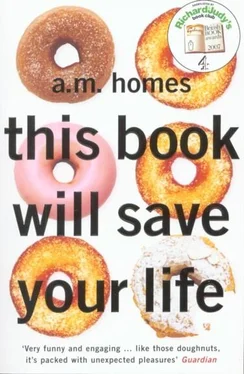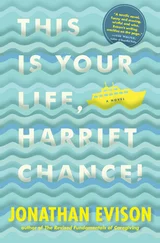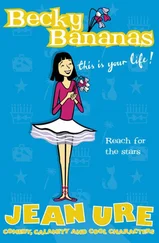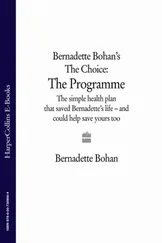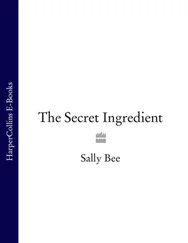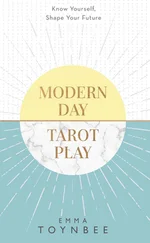The policy seems complete, though there's some language referring to damage that's a result of an act of God.
He goes to sleep, bloated, belching, the sausage replaying itself. He dreams of falling through a vortex to middle earth, a journey deep into the center of Los Angeles, sliding down a riveted, twisting titanium slide, sloshing through tar pits, roaming a desert-grass landscape fearing the saber-toothed tiger. He dreams of a tall, windowless cement building, a series of rooms, of time folding in on itself like origami. He wakes up in the middle of the night with the flavor of pizza in his mouth. He brushes his teeth and goes back to bed.
HE IS THE wake-up call. By four-forty-five, he has double-bagged the evidence — the leftover pizza, the cold salmon dinner — has taken the trash out, and is on the treadmill. Stiff from the accident, his leg is throbbing, but he is trying to keep everything loose. He will start again. Every day he will begin again. He is on the treadmill, on the computer, working. He has to get something done before he can go back to Anhil.
Riding the wave of the market, catching it on the up, betting on the down. He thinks about what he knows, his base of information, this world of possibilities, futures, narratives, histories.
He places his bets — that's how he thinks of them — walks three miles, takes a fast shower, pours some of his special cereal into a Ziploc bag, throws in a couple of the herbal-tea sachets, and goes to the car. It's 5:30 a.m., almost exactly the same time as yesterday. It is still dark, the day/the night in a dream state, suspended.
Backing out of the garage, he feels like he's sneaking out, like he's trying not to be noticed. It is not too early to be up, but it is definitely too early to be out.
He coasts downhill — he will bring his breakfast to Anhil, they will talk, Anhil will see his car, it will be a good day.
Where is the donut shop? He makes a left, makes a right, driving down and down, as though the city is built on a slant, an invisible mountain. He has trouble finding the place. He drives back to Cedars-Sinai, makes a three-point turn at the emergency room door, and goes from there. He passes a new park, a green grassy hill, a knoll where homeless people are sleeping under a pergola. He is going over the route, thinking about how, every time you go down a road, depending on how you do it, fast or slow, by car, bus, or on foot, you notice something different. He is thinking about the route, about the park where people are sleeping, and for some reason he starts thinking about the Kennedy assassination — routes and motorcades, cars speeding off, the futile urgency of the situation.
He was in school. The world had come to an end, an apocalypse had been announced. Why weren't the air-raid sirens going off? Why weren't they ducking under their desks? Why wasn't anyone doing anything? Instead, they sat mute in front of television sets and listened to Walter Cronkite. Because he could talk, because he could dab a tear from his eye, Walter Cronkite seemed like the only person who had survived.
He remembers being sent home, surprised there was anyone home, surprised there was dinner that night, surprised things continued on.
"I knew a fellow who worked for Kennedy, made his suits, knew his measurements," his father said, trying to connect himself to the situation, to touch the life of someone who had touched the life of…
Why is he thinking about this?
And then there it is, up there on the right — glowing. He parks at the curb. The store is empty; he imagines something has happened: Anhil has been shot in a holdup, he will find him in the kitchen, bleeding.
Like a puppet, Anhil pops up from behind the counter. "Good morning."
Holding his Ziploc of cereal and tea and feeling slightly ridiculous, Richard stands at the counter. "Have you got a cup of hot water?"
Is Anhil surprised that he's back? Yesterday, when he said, "See you tomorrow," did he mean it euphemistically, like "Have a good day"?
Anhil brings him the hot water. "How is your heart this morning?"
"Good," Richard says. "Very busy." He drops the sachet in the water.
Anhil stares at it, like it should foam or fizzle. Finally he looks up. "I'm glad you're back."
While the tea steeps, Richard tells Anhil about the martini, the crying woman, the lost pizza man, the sinkhole.
"Maybe you have visitors?" He looks up at the ceiling. "From above. Late at night I watch television, they talk about all kinds of things. At three in the morning, it's hard not to believe them."
"You're not taking me seriously," Richard says.
"Yes, I am, but do you expect the earth to stand still while we run all over it? Did you bring your car?"
Richard nods. Excited, Anhil runs out of the store. The car is at the curb — it is big and black and looks like a tank that would belong to a hotel, or to someone who is accustomed to being driven. Richard is not sure why he has such a big car. He got it because it was reliable, because, like any New Yorker driving in this town, he wanted some protection. He got it because ten years ago, when he went into the dealership looking for something, small, compact, the guy convinced him that he needed a tank. Black is not the color of Los Angeles, it's the color of New York. Los Angeles is champagne, cream, white, silver, gold — things that have no color, things that blend into the landscape.
"It's not really mine," he says, apologetically, "it's leased."
"Of course it is. No one can just buy one of these. You have to be a king to own a Mercedes."
It's leased because he can deduct the entire cost as a business expense, because if the car ever needs to be repaired the dealer comes and gets it, leaves a loaner, and delivers the car back when it's ready. It's leased because all he has to do is say yes and every other year a brand-new big black car, the latest-model tank, arrives in his driveway, thick with the sweet, pungent new-car smell.
Anhil caresses the metal, running his hands over every curve like it is a human body, like he is a blind man reading the most luscious Braille. He opens the doors and touches everything: the lighter, the seat controls, the rearview mirror.
"She is the African Queen," Anhil says. "If she was mine I would polish her every day, I would clean her with Q-tips." He rubs his hands over the seats. "The leather — it is like the most beautiful woman. If I didn't think my wife would worry, I would make love to your car." He opens and closes the trunk several times. He moves as if to try and lift the car up from the bumper; is he testing the car, testing his own strength? "This is my dream. I do not want too many personal things, but a good car is my dream. I'm going to drive your car. Yes? Will you watch the store?"
Richard nods. How can he say no? How can he not let this guy drive his car?
Will you watch the store? What does that mean, tell anyone who comes that Anhil has stepped out and he'll be right back, close the door and flip the "Open" sign to "Closed"?
He goes inside and stands waiting. A guy comes in; Richard feels obligated to go behind the counter, as if guarding the place. "It's not my shop," he confesses.
"Does that mean I can't get a donut?"
He can't lose business for Anhil. "What kind would you like?"
"Glazed, and a coffee with milk and sugar."
He puts the donut on a plate and puts the plate down in front of the man and pours him a cup of coffee. It feels strange, like he's pretending. And while the man is eating another guy comes in and sits at the counter.
"Orange juice, some tea, and a toasted bagel."
"No bagels, just donuts."
"Really? There are usually bagels in the back."
He walks into the back and, sure enough, on the counter are a bag of bagels and a toaster. He toasts the bagel, pours the man a glass of juice, finds the tea bags, and serves the man.
Читать дальше
